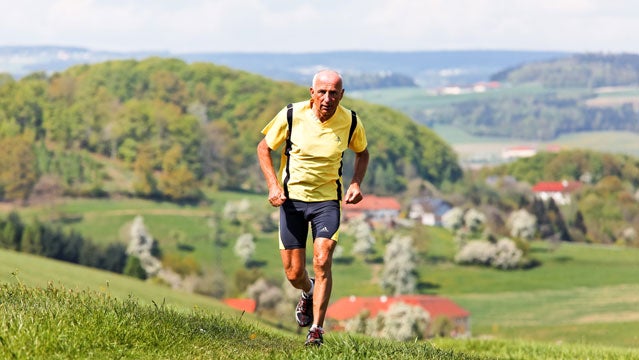It sounds like you must have a stay-fit secret or two, 18K climber.
We posed your question to , professor of gerontology at the Saint Louis University School of Medicine, and co-author of the book . Below, his no-nonsense advice on staying active forever. But be warned: not all of it is speed-climbing and roses. We’ll start with the harsh facts.
We lose about one percent of our athletic ability per year starting at age 30, Morley says. Peruse world records set by age, and this seems likely. The men’s for 60-year olds (2:36:30), for instance, is about 26 percent slower than the record for 35-year olds (2:03:59).
“You must be able to accept you’re not going to be able perform quite as well as you did when you were younger,” Morley says. In your youth, you had to be aware of your own limits to avoid injury, and the same goes for when you age up.
Morely likes to have older athletes look at the decline in world records by age as a reminder that even the best athletes slow down. Part of that dwindling speed has to do with shortening of tendons, and a decline in nerve function—two issues that make it difficult to move your muscles as quickly as you did when you were younger.
But instead of lamenting the (currently) inevitable (who knows what age-defying drugs will be invented in the future), let’s talk about what you can do now to keep participating in your favorite activities comfortably. It all has to do with preserving muscle.
1. Hit the weights
“You need to do some weight lifting to maintain the ability to do aerobic sports,” Morley says. The Centers for Disease Control and Prevention have they recommend performing two to three times per week to maintain muscle mass.
2. Maintain your weight
Clearly, someone who’s overweight should lose pounds under a physician’s guidance. But one big problem Morley sees in the older active population is detrimental dieting. “If you diet, you lose about 75 percent of the weight in fat, about 23 percent is muscle, two percent is bone. And if you do what most dieters do then put back on weight, unless you’re doing this all with exercise, you put on fat and no muscle and no bone,” Morley says. The end result: muscle loss and a limited capacity for aerobic exercise. So if you’re a healthy weight, don’t short yourself on calories. The recommends active women over 50 take in 2,000 to 2,200 calories per day, and that active men over 50 eat 2,400 to 2,800 calories per day.
3. Get your protein
“You need a whey-like protein,” Morley says, to help maintain your muscle. If you’re not losing muscle mass, you should be eating at least 0.8 grams of protein per kilogram of bodyweight per day (about 54 grams of protein for a 150-pound person). If you are losing muscle mass, up that to 1-1.5 grams per kilogram per day (68 to 102 grams for a 150-pound person).
4. Try Tylenol
“Many people have arthritic type pains, and they can help themselves by taking a Tylenol before they exercise. It might allow them to exercise a little bit more than they would normally be able to exercise,” Morley says.
THE BOTTOM LINE: Doing everything you can to maintain muscle mass (weight lifting, maintaining a healthy diet with an adequate amount of protein) will not only aid your agility, but also help you keep up your aerobic capacity. Speed will inevitably decline as you age, but there are still masters athletes out there accomplishing amazing things; at 76, runner ran a marathon in 3:04:54, besting the harshest Boston Marathon qualifying time by six seconds.


